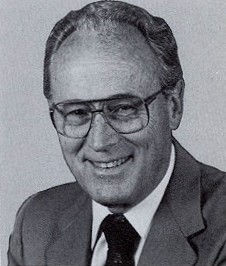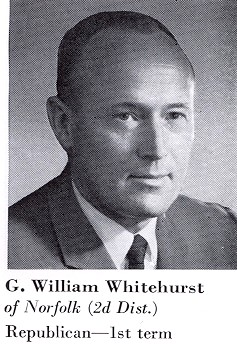G. William Whitehurst facts for kids
Quick facts for kids
G. William Whitehurst
|
|
|---|---|
 |
|
| Member of the U.S. House of Representatives from Virginia's 2nd district |
|
| In office January 3, 1969 – January 3, 1987 |
|
| Preceded by | Porter Hardy Jr. |
| Succeeded by | Owen B. Pickett |
| Personal details | |
| Born | March 12, 1925 Norfolk, Virginia, U.S. |
| Political party | Republican |
| Spouse |
Jennette Seymour Franks
(m. 1946; died 2009) |
| Children | 2 |
| Alma mater | Washington and Lee University (BA) University of Virginia (MA) West Virginia University (PhD) |
| Profession | Journalist, academic |
George William Whitehurst (born March 12, 1925) is an American politician, journalist, and professor from Virginia. He was a member of the United States House of Representatives for the Republican Party from 1969 to 1987.
Before his time in politics, he was a professor at a college that later became Old Dominion University. He even served as the Dean of Students, a person who helps manage student life at a university. After nearly twenty years in Congress, he returned to Old Dominion University to teach again.
Contents
Early Life and Education
George William Whitehurst was born in Norfolk, Virginia, on March 12, 1925. After graduating from high school in 1942, he joined the United States Navy during World War II. He served as an aviation radioman in the Pacific from 1943 to 1946.
After the war, he married Jennette Seymour Franks in 1946. They had a daughter and a son.
Whitehurst was very focused on his education. He earned three degrees:
- A bachelor's degree in history from Washington and Lee University in 1950.
- A master's degree in history from the University of Virginia in 1951.
- A Ph.D. (a high-level degree for experts) in American Diplomatic History from West Virginia University in 1962.
He began teaching at the Norfolk campus of the College of William & Mary in 1950. This school grew and became Old Dominion University in 1962. He worked there until 1968, when he decided to run for Congress.
A Career in Congress
In 1968, Whitehurst was elected to the U.S. Congress. He was the first Republican to represent his part of Virginia in a long time. This was a big deal because the area usually elected politicians from the Democratic Party.
Whitehurst described himself as a "moderate conservative." This means his political views were in the middle, not extremely one way or the other. For example, he voted for the Equal Rights Amendment, which aimed to give women equal rights. He also supported extending the Voting Rights Act, which protected the right to vote for all citizens.
Voters liked him, and he was re-elected eight more times. He was so popular that from 1978 to 1984, the Democratic Party didn't even have a candidate run against him in some elections. He chose to retire from Congress in 1987.
While in Congress, he served on important groups called committees, including:
- The United States House Committee on Armed Services, which deals with the military.
- The United States House Permanent Select Committee on Intelligence, which oversees spy agencies.
- The United States House Committee on Ethics, which makes sure members of Congress follow the rules.
Life After Politics
After leaving Congress, Whitehurst did not stop working. He went back to Old Dominion University in 1987 to teach public affairs. He also worked as a political expert for the local TV station WTKR in Norfolk. He finally retired from teaching in May 2020.
Political Views in Later Years
Even though he was a lifelong Republican, Whitehurst sometimes disagreed with his party's choices.
2016 Presidential Election
In 2016, Whitehurst and other former Republican members of Congress signed a letter. The letter stated they did not support Donald Trump for president. They felt he did not represent the values they believed in.
2020 Presidential Election
In 2020, Whitehurst was one of 24 former Republican lawmakers who publicly endorsed, or supported, the Democratic candidate Joe Biden for president.
Election Results
Here is a look at how Whitehurst won his elections for Congress:
- 1968: Won with 54.2% of the vote.
- 1970: Won with 61.7% of the vote.
- 1972: Won with 73.5% of the vote.
- 1974: Won with 60% of the vote.
- 1976: Won with 65.7% of the vote.
- 1978: Ran unopposed (no one ran against him).
- 1980: Won with 89.8% of the vote against an independent candidate.
- 1982: Ran unopposed.
- 1984: Ran unopposed.
 | James B. Knighten |
 | Azellia White |
 | Willa Brown |


